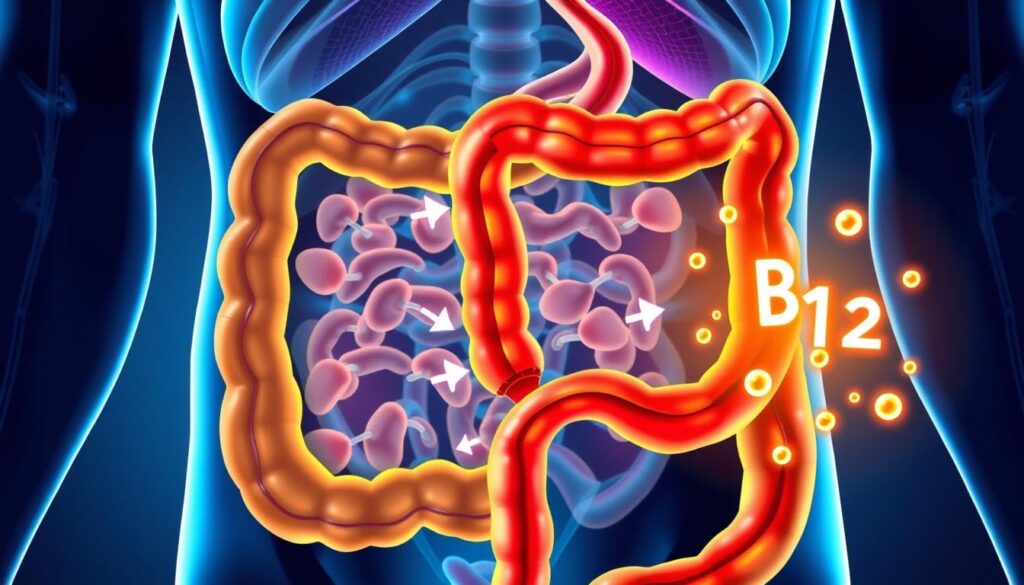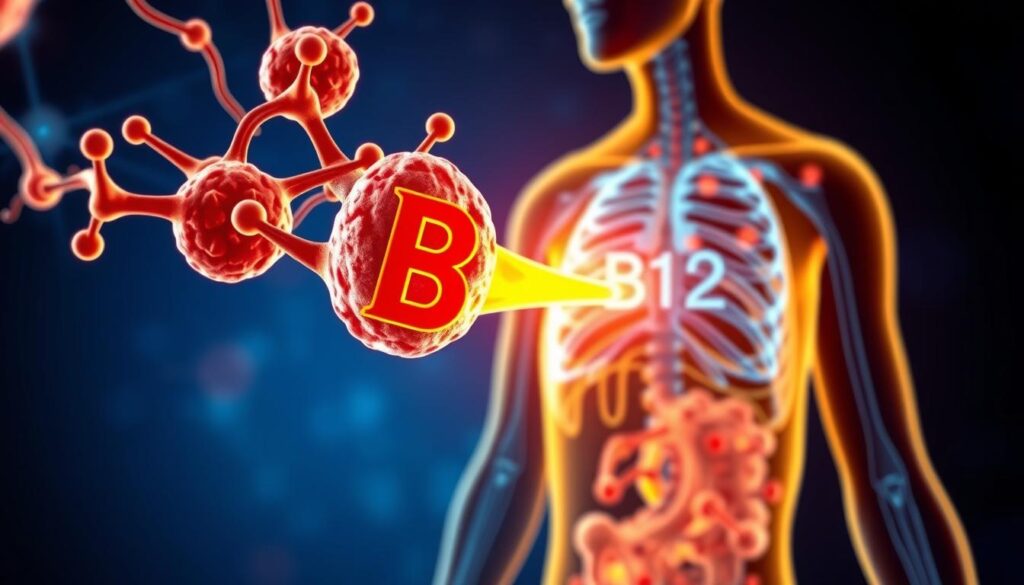Vitamin B12, also known as cobalamin, is key for our body’s health. But, which organ needs it the most? The answer might surprise you and change how you see vitamin B12. Learning about this nutrient could help us stay healthy and feel better.
Key Takeaways
- Vitamin B12 is essential for the development, myelination, and function of the central nervous system
- Vitamin B12 is required for healthy red blood cell formation and DNA synthesis
- Vitamin B12 functions as a cofactor for two enzymes critical for various metabolic processes
- Deficiency in vitamin B12 can lead to serious health issues, including anemia and neurological problems
- Certain conditions and dietary choices can increase the risk of vitamin B12 deficiency
Introduction to Vitamin B12
Biological Functions and Forms of Vitamin B12
Vitamin B12, also known as cobalamin, is a water-soluble essential nutrient. It plays a key role in many bodily functions. You can find it in some foods, added to others, and as a supplement or prescription.
This vitamin is vital for the nervous system, making red blood cells, and DNA. The active forms are methylcobalamin and 5-deoxyadenosylcobalamin. Other forms like hydroxycobalamin and cyanocobalamin can also become active.
Vitamin B12 works with two enzymes: methionine synthase and L-methylmalonyl-CoA mutase. These enzymes are crucial for body metabolism.
| Vitamin B12 Forms | Biological Activity |
|---|---|
| Methylcobalamin | Metabolically active form |
| 5-deoxyadenosylcobalamin | Metabolically active form |
| Hydroxycobalamin | Can be converted to active forms |
| Cyanocobalamin | Can be converted to active forms |
The daily vitamin B-12 need for adults is 2.4 micrograms. While rare in the U.S., those on a vegetarian or vegan diet and older adults face a higher risk of deficiency.

“Vitamin B-12 is required for the development, myelination, and function of the central nervous system; healthy red blood cell formation; and DNA synthesis.”
Absorption and Transportation of Vitamin B12
Role of Stomach and Intrinsic Factor
Vitamin B12, also known as cobalamin (Cbl), is vital for our bodies. It’s absorbed and transported through complex steps, mainly in the stomach. This process relies on the stomach’s production of intrinsic factor.
When we eat, B12 binds to proteins. To be absorbed, it must break free from these proteins. This starts in the mouth and continues in the stomach, where acids and enzymes help release the B12.
In the duodenum, enzymes release the B12 from its binding protein. It then binds to intrinsic factor, a protein made by the stomach. This complex is absorbed in the ileum through a special process.
People with pernicious anemia often can’t absorb enough B12 because they lack intrinsic factor. Those on a vegetarian diet or taking certain meds may also struggle. They might need B12 supplements to get enough.
Good stomach function is key for B12 absorption. It needs hydrochloric acid and intrinsic factor. Knowing how B12 is absorbed helps us see why it’s so important and the effects of B12 deficiency.

Assessing Vitamin B12 Status
Keeping your vitamin B12 levels right is key for good health. The first step is to check if you have enough B12. Doctors usually look at your serum or plasma B12 levels to see if you’re deficient.
Experts say a normal vitamin B12 level is between 200 to 800 picograms per milliliter (pg/mL). If it’s less than 200 pg/mL, you might have a B12 deficiency. But, things like multiple myeloma, HIV, pregnancy, and some medicines can also affect your B12 levels.
Doctors also check your serum methylmalonic acid (MMA) and total plasma homocysteine levels. If your MMA is over 0.271 micromol/L or your homocysteine is more than 15 micromol/L, it could mean you’re not getting enough B12, even if your B12 levels seem fine.
Getting a B12 test involves a blood draw. This can lead to bleeding, fainting, or infection. It’s vital to talk to your doctor about these risks. They can help make sure the test is safe and accurate for checking your B12 status.
| Indicator | Normal Range | Deficiency Threshold |
|---|---|---|
| Serum or Plasma B12 Level | 200 to 800 pg/mL | Less than 200 pg/mL |
| Serum Methylmalonic Acid (MMA) | Up to 0.271 micromol/L | Greater than 0.271 micromol/L |
| Total Plasma Homocysteine | Up to 15 micromol/L | Greater than 15 micromol/L |
Knowing the signs and levels for vitamin B12 deficiency helps doctors figure out if you need more B12. They might suggest changing your diet, taking B12 supplements, or treating any health issues that could be causing the deficiency.

Recommended Dietary Allowances for Vitamin B12
The Recommended Dietary Allowance (RDA) for vitamin B12 changes with age and sex. Adults over 14 need 2.4 micrograms (mcg) daily. Pregnant women should get 2.6 mcg, and breastfeeding moms need 2.8 mcg.
These amounts help keep blood healthy and vitamin B12 levels right. Infants get a special amount based on what healthy, breastfed babies eat.
| Age Group | Recommended Dietary Allowance (RDA) or Adequate Intake (AI) |
|---|---|
| 0 to 6 months | 0.4 mcg (AI) |
| 7 to 12 months | 0.5 mcg (AI) |
| 1 to 3 years | 0.9 mcg |
| 4 to 8 years | 1.2 mcg |
| 9 to 13 years | 1.8 mcg |
| 14 years and older | 2.4 mcg |
| Pregnant women | 2.6 mcg |
| Breastfeeding women | 2.8 mcg |
People on a vegetarian diet or with digestion problems might need B12 supplements. It’s wise to talk to a doctor to make sure you’re getting enough b12 sources and supplements.

What Organ Needs B12?
Organs Involved in B12 Absorption and Utilization
Vitamin B12, also known as cobalamin, is vital for our bodies. It’s needed by several organs, like the stomach, small intestine, and liver.
The stomach starts vitamin B12 absorption. It makes hydrochloric acid and intrinsic factor protein. These are key for vitamin B12 release and transport from food. Without them, b12 deficiency can happen.
The small intestine, especially the distal ileum, absorbs vitamin B12. Here, the vitamin B12-intrinsic factor complex is absorbed. This ensures the nutrient goes to the liver for storage and use.
The liver stores vitamin B12, holding up to 1,000-2,000 times what we eat daily. It’s also key for using vitamin B12 in our body. This includes making red blood cells and keeping our nervous system healthy. Poor liver function can lead to pernicious anemia, a b12 deficiency type.
“Proper vitamin B12 absorption and utilization by these key organs is essential for maintaining overall health and preventing various deficiency-related conditions.”
Food Sources of Vitamin B12
Vitamin B12 is key for our bodies. It’s mainly found in animal products, but some plant foods are fortified too.
Animal sources of vitamin B12 include fish, meat, poultry, eggs, and dairy. These foods have lots of B12. For example, lamb liver is very rich, with one serving giving over 3,500% of the Daily Value (DV) for vitamin B12.
| Food | Vitamin B12 Content (% of DV per serving) |
|---|---|
| Beef Liver | 467% (in a 190-gram grilled flat iron steak) |
| Rainbow Trout | 312% (in a 100-gram serving of fillet) |
| Salmon | 208% (in a 178-gram fillet) |
| Clams | over 7,000% (in 190 grams or 20 small clams) |
| Sardines | 554% (in a 150-gram serving) |
Vegetarians can get vitamin B12 from fortified non-dairy milks, cereals, and nutritional yeast. These foods are made to have enough B12 for vegetarians and vegans.
The way our body absorbs vitamin B12 can differ by food. Dairy is usually better than meat, fish, and poultry. Vitamin B12 supplements are also very absorbable, great for those who need more or follow a strict plant-based diet.
Vitamin B12 Supplements
Vitamin B12 is key for our health and comes in different forms for supplements. These are for people at risk of b12 deficiency. The most common form is cyanocobalamin, but others like adenosylcobalamin, methylcobalamin, and hydroxycobalamin are also out there.
When it comes to how well our body absorbs vitamin B12 from supplements, it’s about 50% at doses under 1-2 mcg. But, this number drops a lot at higher doses. This is something to think about when picking the right b12 supplements and figuring out the right amount to take.
Forms and Dosages of B12 Supplements
People at risk of deficiency, like older adults, pregnant or nursing women, vegetarians and vegans, and those with certain health issues, might need B12 supplements. The daily amount most adults need is 2.4 micrograms (mcg).
Studies suggest b12 supplements can help with bone health, lower the risk of macular degeneration, and improve mood. But, it’s smart to talk to a doctor to find out the best form and amount for you, based on your health and needs.
“Vitamin B12 is a critical nutrient for overall health, and supplementation can be especially beneficial for those at risk of deficiency.”
Vitamin B12 Deficiency
Vitamin B12 deficiency can happen if you don’t get enough from food or can’t absorb it well. Some groups are more likely to face this issue. These include older adults, people with pernicious anemia, and strict vegetarians or vegans.
Symptoms of B12 deficiency include feeling tired, weak, and pale. You might also have heart palpitations, loss of appetite, and weight loss. Other signs are numbness in hands and feet, balance problems, depression, confusion, and memory issues. If not treated, it can cause serious health problems.
Causes and Risk Factors
Pernicious anemia is the main reason for B12 deficiency. It’s an autoimmune condition that stops B12 absorption. Older adults often have trouble absorbing B12 from food because their stomach acid decreases.
Some medicines, like proton pump inhibitors and metformin, can also block B12 absorption. People with immune system disorders, such as Graves’ disease or lupus, are at higher risk too.
Vegetarians and vegans who don’t eat enough fortified foods or supplements are at risk. Since animal products are the main source of B12, they need to be careful.
Diagnosis and Treatment
Doctors usually find B12 deficiency through blood tests. Sometimes, more tests are needed.
Treatment often includes B12 injections and folic acid supplements. People on special diets might need long-term supplements. Eating a balanced diet and getting help from a nutritionist can also help manage the deficiency.
| Statistic | Value |
|---|---|
| Less than 1% of people with B12 deficiency report experiencing optic neuropathy | Less than 1% |
| Recommended daily amount of B12 for children aged 9-13 years | 1.8 micrograms |
| Individuals following a strict vegan diet more likely to have B12 deficiency without fortified foods or supplements | Higher likelihood |
| Pernicious anemia is the most common cause of vitamin B12 deficiency | Most common cause |
| Many people over 50 may struggle to absorb B12 from foods due to decreased stomach acid | Many people over 50 |
Knowing about B12 deficiency can help you stay healthy. By understanding the causes and how to manage it, you can avoid serious health problems.
Conclusion
Vitamin B12 is key for our health. It helps keep red blood cells healthy, supports nerve function, and aids in DNA creation. It’s especially important for older adults, pregnant women, and those who don’t eat meat.
Knowing about vitamin B12 and its sources is vital. It helps us avoid deficiency. Regular blood tests and a diet full of B12 can prevent deficiency. This is important because B12 deficiency can lead to serious health problems.
Eating foods rich in B12 or taking supplements can boost health. It helps avoid complications and keeps the liver, red blood cells, and nerves working well. Being aware of vitamin B12’s role and taking action can lead to a healthier life.





